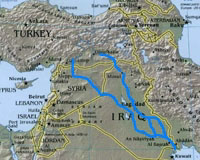 |
Cairo (UPI) Mar 31, 2011 The apparent defection of Moammar Gadhafi's long-serving spy chief, Musa Kusa, will undoubtedly give Western security services a treasure trove of intelligence on the beleaguered Libyan regime and the misdeeds of its leader over the years. But Kusa's high-profile defection to Britain will also have a more profound significance in the Arab world at a time when the myth of the all-powerful intelligence services that keep regimes like Gadhafi's in power through murderous intimidation is being undermined by popular uprisings against repressive regimes on power for decades. "The imperative now is to end our condition of collective captivity to military orders and liberate the Arab spirit and mind," Jordanian commentator and academic Rami Khouri, wrote in May 2006. "Bringing Arab military and security establishments under the oversight and control of civilian institutions is critical to this goal," said Khouri, a longtime advocate of ending the power of the Mukhabarat, the generic Arab word for secret police, that has dominated Arab political life for decades. In Egypt and Tunisia, where Presidents Hosni Mubarak and Zine el-Abidine Ben Ali, were overthrown in January and February, the security services' main mission was regime survival rather than protecting the state from external enemies. Discredited by the downfall of their paymasters, these services are starting to undergo restructuring and reorientation, although these efforts remain in their infancy and face immense difficulties. Indeed, in Egypt, the longtime head of intelligence, Gen. Omar Suleiman, who was deeply involved in excesses conducted against dissidents and Islamists deemed a threat to the regime, has made the switch and is supposedly helping develop a new political system. But many see this as little more than a cosmetic adjustment by the ancien regime to retain its hold on power. Still, Egypt's much-hated State Security Investigations Sector, the secret police who spied on and tortured suspected dissidents, is supposedly being dismantled and replaced by a more accountable organization "in accordance with the constitution an human rights principles." Former Interior Minister Habib el-Adli, accused of ordering security forces to fire on protesters during Egypt's 18-day uprising, is to go on trial, along with some of his minions. Tunisia's new government is weeding out personnel, most notably Abdessatar Bennour, head of the National Security Directorate, in its security and intelligence apparatus who were loyal to the ousted Ben Ali. But dismantling a security establishment as vast as the one Hosni Mubarak built up during his 30 years of authoritarian rule will be no small undertaking. Other Arab rulers did the same but Mubarak's buildup was extraordinary. He steadily expanded the size of the security force, particularly the SSIS, and its powers of arrest, intimidation and torture. In 1974, the Interior Ministry commanded 150,000 personnel. By 2009, the strength was an estimated 1.7 million, including 400,000 SSIS officers, 850,000 policemen and associated staff, and 450,000 Central Security Force troops. They outnumbered the army 3-1, and in 2002 accounted for one-fifth of all government employees. No Arab security apparatus has ever been dismantled and been made accountable before. Over the years, Arab rulers have justified vast and heavy-handed security and military forces by citing the war with Israel, Islamic terrorism or intra-Arab feuding such as the long and bloody dispute between Iraq and Syria in the 1970s and 80s. Damascus and Baghdad, ruled by rival wings of the Baath Party, used their intelligence services to conduct terror campaigns against each other. Both these regimes, as well as other Arab rulers, widely used Palestinian factions who became the mercenaries of the Arab's constant feuding to mount terrorist attacks on the West or each other to give them "plausible deniability." The late Hafez Assad, a Soviet-trained air force general who ruled Syria with an iron grip from 1970-2000, built an extraordinary network of intelligence and security services whose primary function was keeping his minority Alawite regime in power. His son Bashar, who inherited power when Assad died in June 2000, has retained that vast apparatus and is now using it to crush Syria's own insurgency that began two weeks ago. Kusa, the ultimate insider, may spill a lot of beans that will help end the power of the Mukhabarat in the Arab world but many more protesters may have to die first.
Share This Article With Planet Earth
Related Links Democracy in the 21st century at TerraDaily.com
 Turkish 'zero problem' policy hampered by Arab revolts
Turkish 'zero problem' policy hampered by Arab revoltsIstanbul (AFP) April 1, 2011 Turkey's ambitious diplomatic policy of "zero problem" with its neighbours, notably aimed at building closer ties with Arab leaders, is hampered by the ongoing rebellions in the Middle East, experts said. "The 'zero problem' policy has been overtaken by events," Semih Idiz, columnist of the liberal daily Milliyet, told AFP. "It is a policy based on status quo, not on evolution ... the re ... read more |
|
| The content herein, unless otherwise known to be public domain, are Copyright 1995-2010 - SpaceDaily. AFP and UPI Wire Stories are copyright Agence France-Presse and United Press International. ESA Portal Reports are copyright European Space Agency. All NASA sourced material is public domain. Additional copyrights may apply in whole or part to other bona fide parties. Advertising does not imply endorsement,agreement or approval of any opinions, statements or information provided by SpaceDaily on any Web page published or hosted by SpaceDaily. Privacy Statement |